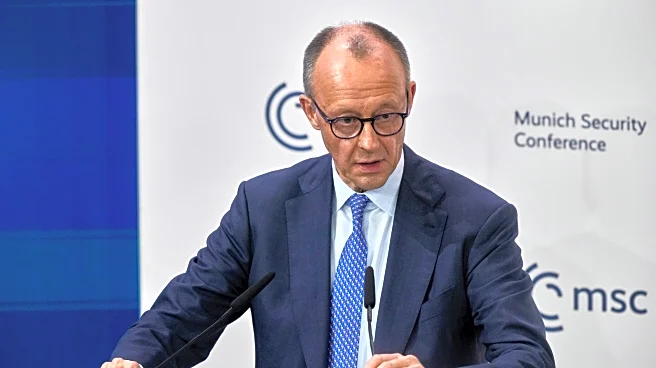What's Happening?
The Migration Advisory Committee (MAC) has recommended that most construction roles remain on the Temporary Shortage List (TSL) for immigration purposes in the UK. This list allows professionals to move to the UK to fill key occupations deemed crucial for government ambitions. The MAC's review suggests pilot projects for sector-wide or umbrella sponsorship models, which could benefit smaller firms by reducing administrative burdens while maintaining salary and worker protection standards. The list includes 82 occupations, such as bricklayers, electricians, and painters, which do not require degree-level training. The recommendations are part of a broader strategy to address labor shortages in critical infrastructure sectors.
Why It's Important?
The MAC's recommendations are significant as they aim to address labor shortages in the construction sector, which is vital for delivering government infrastructure projects. By keeping these roles on the TSL, the UK can attract overseas talent to fill gaps in the workforce, potentially reducing labor costs and enhancing project delivery efficiency. This move could also influence immigration policy, making it more flexible and responsive to industry needs. The construction sector stands to benefit from a more streamlined process for hiring skilled workers, which could lead to improved project outcomes and economic growth.
What's Next?
The recommendations are not final, and the list is expected to be refined further. If approved by the government, the MAC will test the 82 roles to ensure they are genuinely in shortage and have a comprehensive jobs plan, including a skills strategy and domestic labor strategy. Representative bodies for each role will need to provide evidence to the committee. A follow-up report is scheduled for publication in July 2026, which will further assess the effectiveness of these recommendations and their impact on the construction labor supply.
Beyond the Headlines
The MAC's recommendations could lead to long-term shifts in immigration policy, emphasizing the need for flexible visa models tailored to specific sectors. This approach may set a precedent for other industries facing similar labor shortages, potentially influencing broader immigration reform. Additionally, the focus on maintaining worker protection standards highlights the ethical considerations in managing migrant labor, ensuring fair treatment and preventing exploitation.











